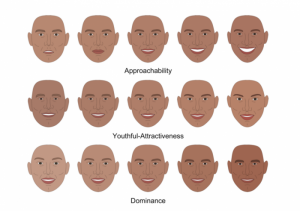It is possible to predict what people think about you from a first impression gleaned from facial features?
In a new study UK’s University of York researchers have created a scientific model that can predict first impressions based on facial features.
The research team, led by Dr. Tom Hartley and Prof. Andy Young of the Department of Psychology, say that although our first impression judgements are often flawed, they influence our subsequent behaviour in relation to that person.
 Image credit: University of York
Image credit: University of York
This means that we tend to make assumptions about a person’s personality – for example whether they are trustworthy or kind.
The researchers aimed to to discover what exactly makes us judge others by their facial features.
“Understanding how first impressions are formed to faces is a topic of major theoretical and practical interest that has been given added importance through the widespread use of images of faces in social media,” they explain.
A photo ‘could make or break others’ first impressions of you’
The study analysed the the physical features of 1,000 faces from various photographs available online. A panel of judges, then made judgements of that person’s character based on their faces.
The researchers then took 65 different measurements of each face, including eye height and eyebrow width, in order to create a model to predict first impressions.
The team found that their model was able to account for 58% of the variance in the judges’ impressions of the faces.
The researchers have used these measurements to create cartoon-like faces that show the facial features associated with initial perceptions of approachability, youthful-attractiveness and dominance.
The study, the researchers say, emphasizes the importance of faces in creating a first impression – something that Hartley says is surprising:
“In everyday life, I am not conscious of the way faces and pictures of faces are influencing the way I interact with people. Whether in ‘real life’ or online, it feels as if a person’s character is something I can just sense. These results show how heavily these impressions are influenced by visual features of the face – it’s quite an eye opener!”
The team says their findings may even provide insight into the “instinctive expertise” of individuals who create and manipulate photographs in their line of work, such as casting editors and animators.
“Showing that even supposedly arbitrary features in a face can influence people’s perceptions suggests that careful choice of a photo could make (or break) others’ first impressions of you,” says study author Richard Vernon, PhD.
Earlier this year, Medical News Today reported on a study by researchers from Ohio State University, revealing how they have taught computers to recognize 21 different human emotions from distinct facial expressions.
